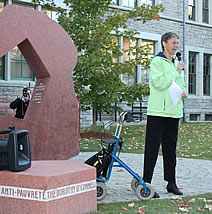Act Now

Empower U: Learn to Access Your Disability Rights Training on Canadian Human Rights, the Convention on the Rights of Persons with Disabilities (CRPD) and its Optional Protocol (OP) training aims to increase awareness of how to address discrimination using more familiar Canadian human rights laws such as Human Rights Codes and the newer international Convention on the Rights of Persons with Disabilities (CRPD). This is training for persons with disabilities by persons with disabilities. The training is part of a project funded by Employment and Social Development Canada and implemented by the Council of Canadians with Disabilities (CCD) in collaboration with Canadian Multicultural Disability Centre Inc. (CMDCI), Citizens With Disabilities – Ontario (CWDO), Manitoba League of Persons with Disabilities (MLPD) and National Educational Association of Disabled Students (NEADS). Read more.
Sign Up for our monthly digest
A monthly newsletter from CCD about what is happening in the community
Report on the Use of Assistive Voting Device for Persons with Disabilities
Related Documents
September 17, 2021
What Are Canada's Political Parties Plans Concerning Inclusive Emergency Preparedness?
September 15, 2021
CCD Seeking an Accessible and Inclusive Post-COVID-19 World: No New Barriers!
September 13, 2021
CCD Seeks Commitments on Accessible and Affordable Housing
January 13, 2010
Hon. Joan Fraser, Chair
Hon. John D. Wallace Deputy Chair
Hon. W. David Angus
Hon. George Baker, P.C.
Hon. Pierre-Hughes Boisvenu
Hon. Claude Carignan
Hon. Sharon Carstairs, P.C.
Hon. James S. Cowan
Hon. Claudette Tardif
Hon. Serge Joyal, P.C.
Hon. Marjory LeBreton, P.C.
Hon. Gerald J. Comeau
Hon. Jean-Claude Rivest
Hon. Robert William Runciman
Hon. Charlie Watt
Hon. James S. Cowan
Hon. Pierre De Bane, P. C.
Hon. Donald Neil Plett
Standing Senate Committee on Legal and Constitutional Affairs
Senate
Ottawa, ON
K1A 0A6
Dear Sir/Madam
The Council of Canadians with Disabilities (CCD), a national Human Rights organization of people with disabilities working for an accessible and inclusive Canada, read, with great interest, your Final Report, "Report on the Use of Assistive Voting Device for Persons with Disabilities" (October 2010).
CCD applauds the work that is currently being undertaken by Elections Canada to address some longstanding barriers to voting that have existed for some voters with disabilities. For many years, voters who are handicapped by print have not had equal access to voting. Like other voters, voters who are handicapped by print want to be able to vote independently and to be able to verify their vote. While there have been in place provisions which allow another person to assist a voter with a disability mark his/her ballot some voters with disabilities wish to vote in secret, which is a fundamental aspect of the Canadian electoral process.
CCD was disappointed by the tone of "Report on the Use of Assistive Voting Device for Persons with Disabilities." The Report seems to miss the point that a human rights issue for a group of Canadian rightsholders, voters who are handicapped by print, is under discussion for the purpose of remedying a long standing barrier. Our reading of the report left the impression that the Committee took a business case approach to the question before it and it has been our experience that the business case approach does not equate well with guaranteeing that people with disabilities will have their rights upheld. Too frequently cost is used as the excuse for denying Canadians with disabilities equal access.
CCD believes that in discussions about assistive voting devices cost must not become the consideration which overshadows all others. Pilot projects like the Winnipeg by-election test may seem costly and labor intensive but this is an important step toward developing a process whereby persons handicapped by print will be have the opportunity to vote in a manner comparable to other electors. Any federal election undertaken entails a major expense but this expense is gladly borne because our society places a high value on democracy. We argue that secret balloting by persons who are handicapped by print is included in this value. Canadians continue to support the elements that are at the bedrock of our democracy. Access to the electoral process has been a concern for CCD since its founding in 1976 and we have always found the nondisabled community to be supportive of people with disabilities eager to accept the responsibilities of citizenship—voting being one of the most important of these responsibilities.
CCD is eager to see the work on the assistive voting device proceed beyond the Winnipeg North by-election. This was one pilot project, albeit a very important one. Following the pilot project, it is our sincere hope that Elections Canada will be supported to continue to seek ways of ensuring equitable voting access for all Canadians, including Canadians with disabilities. Assistive voting devices are being used in other jurisdictions. As a developed nation Canada has an obligation to press into service that technology that removes barriers for people with disabilities so that we can have full enjoyment of our civil rights. While states may adopt a progressive realization approach to economic and social rights, this approach is not acceptable for civil and political rights. As Canada has ratified the Convention on Rights of Persons with Disabilities, it has an increased obligation to ensure that Canadians with disabilities have the opportunity available to cast their ballot in secret.
CCD would welcome the opportunity to meet with members of the Standing Senate Committee on Legal and Constitutional Affairs to share our perspective on assistive voting devices and other issues related to access to the electoral process.
Sincerely,
Tony Dolan
Chairperson

Marie White, a former Chairperson of CCD, addresses anti-poverty rally.
